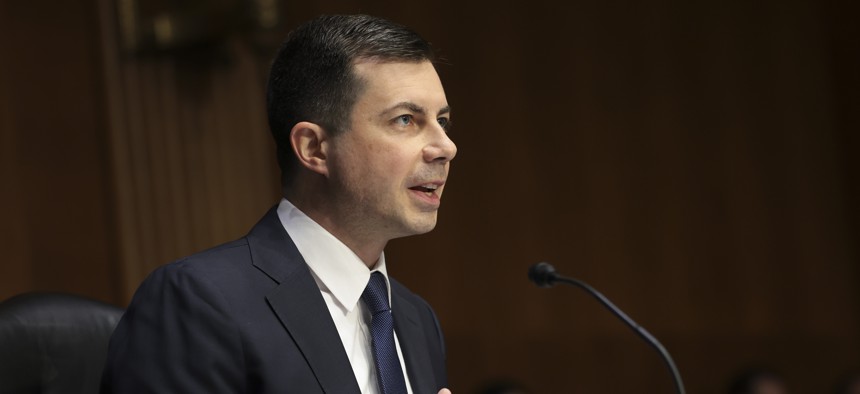Buttigieg to Republicans: States Can Decide How to Use Most Infrastructure Dollars

Getty Inages
But for funds where there is discretion, the Transportation Department will push Biden’s climate policies, the secretary said.
Pressed by Senate Republicans worried the federal government will override the wishes of states, U.S. Transportation Secretary Pete Buttigieg said Wednesday that he recognizes states will decide how to use infrastructure dollars that are distributed to them according to so-called formula funding guidelines.
But Buttigieg told a Senate panel that his department will take into account the Biden administration’s climate policies—including prioritizing making existing roadways safer before widening them—in distributing the part of the Infrastructure Investment and Jobs Act the department can divvy up at its discretion.
The department has been under fire from Republicans after Stephanie Pollack, the deputy administrator running the Federal Highway Administration, issued guidance in December saying the agency is prioritizing improving roads over building new ones-- a key goal for environmentalists.
The agency said it wanted as much of the new money as possible spent on other Biden administration goals, including promoting nonmotorized modes of transportation and addressing climate change.
State transportation departments saw that as the federal government encroaching on their ability to use the funds as they saw fit to meet local needs. The departments pushed back at the idea that the federal government would not recognize the different needs of states and take a “one-size-fits-all” approach. Sixteen GOP governors also warned the FHWA not to “push a social agenda through hard infrastructure investments.”
Last month, Senate Majority Leader Mitch McConnell and Sen. Shelley Moore Capito of West Virginia, a Republican who helped negotiate the bipartisan infrastructure deal, also criticized Pollack’s guidance, writing to governors that the document did not represent what the bipartisan groups of senators who negotiated IIJA had intended.
Questioning Buttigieg at Wednesday’s hearing Sen. Kevin Cramer, a North Dakota Republican, said Pollack’s memo “not only created confusion but concern” the federal government would prioritize giving the funds to states carrying out the administration’s agenda.
“Does this guidance imply a set of priorities in the decisions of the agency in terms of awarding grants?” Cramer asked.
Buttigieg replied that the inclusion of ideas, like wanting to make sure existing roads are in “good repair” before spending money on building new ones, “certainly reflects our priorities in discretionary grants.”
But he drew a distinction between types of funding.
“With regards to [those distributed by] formulas, it’s the states making those calls. We recognize that and support that,” Buttigieg said.
Cramer said later his advice to governors “is to ignore [the guidance].”
Capito Angered by Memo Wording
Capito was particularly incensed that the memo included wording from a House Democratic proposal that was dismissed in the bipartisan negotiations that led to IIJA’s passage.
“I’m really troubled that a memo that comes from your department had language in it from the House bill that had been rejected, basically verbatim,” Capito told Buttigieg.
“So are you in the habit of lifting language from unpassed bills and putting them into regulations you’re putting forward, that obviously had been negotiated out of bills?” she asked Buttigieg.
Buttigieg acknowledged that Rep. Peter DeFazio of Oregon, the Democratic chairman of the House Transportation and Infrastructure Committee, had wanted requirements in the infrastructure act that prioritized improving existing roadways before expanding them or building new ones.
The distinction, he said, is that while DeFazio wanted to require states make sure their roads are in a “state of good repair” before being eligible for funding to do other projects, Pollack’s guidance did not say it was a mandate.
“My understanding is that what was rejected [during the congressional negotiations] was the mandate, not the ideas or the goals,” Buttigieg said.
The secretary said ideas expressed in the memo that projects should be cost-effective and for states to make roads safe are not controversial or partisan. “As we go forward with the implementation of the law we would not impose any such mandate,” he said of the funds distributed to states by formula.
Capito, though, was disturbed that the guidance used DeFazio’s rejected proposal “word for word,” saying Buttigieg’s explanation seemed to be “just because?”
Buttigieg responded, “because they’re good ideas. It’s just that the law does not mandate them so neither will we.”
Kery Murakami is a senior reporter for Route Fifty based in Washington, D.C.
NEXT STORY: Digital services delivery relies on better broadband






